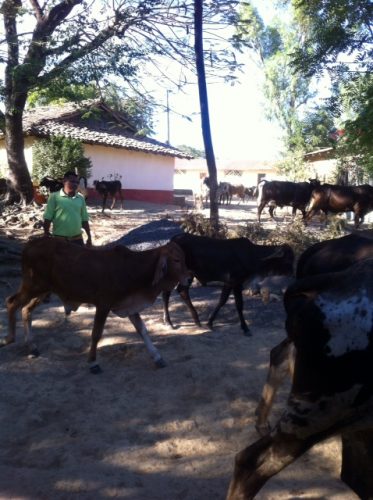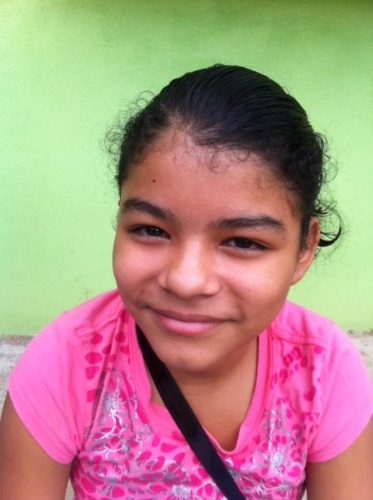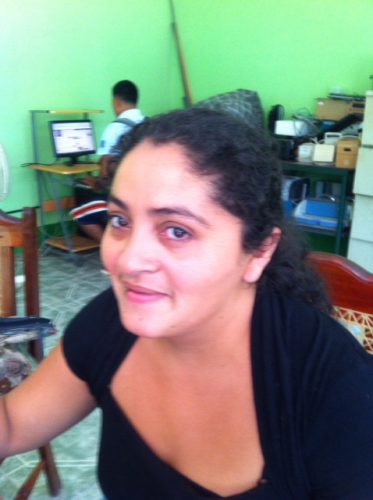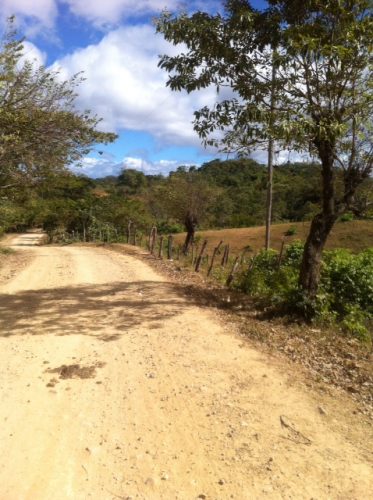A good friend recently reminded me of how I behaved at the Cancun bus station in 1991 when we travelled together through the Yucatan Peninsula. Lilian said that I stood there, surveyed the ticket booth and reception areas , and loudly observed, “They have computers here. I like this place already!” For the record, I am embarrassed by this astonishingly patronizing view, and in the intervening 20 plus years have come in and out of clarity regarding the increasingly complex power relations between north and south and the role of technology in this. This piece will share my most recent learning and teaching journey. In the fall of 2012 and early 2013, I developed an online English course for a small rural village in north-western Nicaragua. The course was a complete disaster.
This origin of the project stems from years of working as a chaperone and faculty advisor for students in the North South Profile at Dawson College in Montreal. For one month, students in this area of study participate in a month-long field trip to Nicaragua, after they have spent three terms studying the nation’s political upheavals and history of oppression and revolution. All of their theoretical studies are put in place as they live with families and confront basic fears. We all learn an immense amount from the Nicaraguans and each other and in some ways what drives us is the desire to contribute to social change that would end these apparent imbalances. Of course, the task seems too enormous and so my efforts usually responded directly to Nicaraguan requests to teach them basic English. I began by researching online platforms and pedagogical approaches to teach English. I knew the grammar, but the Nicaraguans really taught me the fundamentals of human relations.
After five years of visiting rural Nicaragua as part of this profile, I also wanted to take on the project to explore the relationship between digital technology and solidarity work. In the end, I selected a common platform for online course delivery and student management called “Moodle.” The main utility of it for this project, though, had to do with its cost to me and its end users: zero. My project had no budget. I used the resources available to me. Of course, anyone who types “English language course” into a search engine will you will end up with hundreds of links to videos, dictionaries, courses and advertisements. Most of these links, however, have a commercial goal. I wanted to put something together for the Nicaraguan students that was accessible, straightforward and relevant to their daily lives.
The participants who agreed to take part in the project are from various villages called comarcas in the region of Cinco Pinos. A few were living in the area called Esteli, but all had family or close connections there. The area is tucked up in the north-western part of the country, about three hours away from Chinandega by bus, close to the Honduran border. It has a population of about 6,500 and an “official” 20% unemployment rate, which seems remarkably low based on personal observations made over a ten year period of travelling there. Nicaragua is often referred to as the 2nd poorest nation in the Western Hemisphere, after Haiti. You will encounter many theories about why this is the case and why and how this continues. I have opinions about this too, but mainly I see hope in continued solidarity work which could diminish Nicaragua’s dependence upon foreign aid. I say this because in my project, as in Dawson College’s ongoing commitment to the community, there is an emphasis on long-term solidarity projects as opposed to short-term charitable work. I met each of the students individually for a training session in January 2013 at the local Internet centre in the comarca of El Espino, run by a local organization with a very long acronym: Aprodese. The NGO has also run some very innovative training initiatives in the area, from sewing and Internet to woodworking and solar energy.
At its core, my modest project sought answers to some pretty complicated questions and emerged out of a simple request by the community to learn English. A significant portion of Nicaragua’s economy is driven by remittances. Many working age individuals in this region leave in order to help their families. Community members have told me many times that even a little English could help them to secure jobs in the service industries of other Central American countries. Many women, for example, work as chamber maids and leave their infant children with grandmothers to do this. They say that they want to learn English to help their families. Clearly such a project could in no way resolve all of these issues, but it did begin to shed light on the role of education in general in all of this: shockingly simple. How can digital technology work in this context? Would it reinforce inequitable power relations? Who benefits?
The project’s goal was to provide online resources and activities to teach the basics of elementary English to a small test group of community members. There were ten participants, ranging in age from 12 to 33, selected by my Nicaraguan partner. In February 2013, I shared the experience with technology experts, activists and educators at the Canadian MoodleMoot Conference in Vancouver. I am still convinced that there is something in digital platforms that can contribute to solidarity work in this and other regions. At the same time, though, I am equally concerned that such endeavours may also further entrench the power inequities between north and south. Of course, in the process I learned much about learning and as always these students.
The first lesson in cultural assumptions and illiteracy (my own) came inadvertently through the Moodle platform that (like most) requires a username and password. As I mentioned, my Nicaraguan partner selected ten students for the project and was given guidelines for this: more or less anyone willing to learn English. I had received many requests over the years to teach English and thought (and still do with some reservations) that online technology could be a useful tool in this regard. Letis, a primary school teacher in the area, now living in Montreal, sent me the student list with email contact information. My counterpart at Dawson College assigned each of the students a username and password, and enrolled them in the course. We didn’t give this a second thought … until my first in-person training session in January 2013. I spent a week on site and then another few weeks in Leon and Granada building the materials and resources. I realized immediately that the students did not recognize their own usernames. Most common in this type of generic assignment is the practice of putting together the initial of the first name and full last name. This was problematic for most of my students for a number of reasons: most came from single parent families, living in multigenerational, blended households, alongside siblings with different parents, grandparents, cousins, aunts and uncles with correspondingly different and lengthy, hyphenated surnames. Our choice of last name for the otherwise innocent purpose of enrolling these students was the first of a long list of challenging issues. I had a huge AHA moment, and should have known better, I thought. The first in-person session was two hours of specific vocabulary to access the system and logging in and out of the platform several times. All of the students were successful doing this. Five of the students have never logged in a second time. I see in my journal dated January 9, 2013 that I wrote: “The keyboard here is in Spanish; all of the framing for the course is in English. Need a Spanish interface.” At the very beginning of the project, I noted that the first-time access for students to the course was very complicated because of this and that I was “not sure at this point if the students will continue.” I would see the results of this just a few weeks later.
This rural world is so very different from life at Dawson. En route to Cinco Pinos, I met an expert English language instructor who was very interested in the course. In explaining my approach to this individual, it became obvious that I was on the right track of developing contextually appropriate resources, what he called “situational” materials. I knew the needs of the community, I thought. In other words, in gathering online links for use by Spanish speakers with little to no knowledge of English from this geographic region, I was going to emphasize vocabulary development, for instance, that would reflect something of immediate use or application. My students didn’t seem (rightfully) to care about pronouns or infinitives: they were focused on pronunciation. In light of this, I researched and consulted as best I could. I realized, however, that my student group also had too many variables in terms of education and life experience, variables that I could not have anticipated. Tatiana, the 12 year old, had a lot of trouble with spelling in Spanish and I could offer very little help to her, as my Spanish is fairly broken, at best. In many ways, however, she is a symbol of Nicaragua’s future: education is key for her. The online framework, with its emphasis on independent learning might not be the best for her, but she clearly understands the role of education. Future coordinated work in the area might offer study skills workshops, or computer training.
One of the students had never touched a computer. Like many of the Nicaraguans I met, however, Teodora could text with great facility. She is a 33-year-old mom of one son and works hard at combining this role with other household responsibilities: she makes the household tortillas from scratch every morning at 5:00 in the home she shares with her husband and mother-in-law. Her transferable skills are many, and she has incredible personal strength. Teodora needs more assistance to feel confident with computers in general before online learning can be effective. This is not insurmountable, but I could not provide this to her and she has not logged into the course since our first session together.
While the project’s original intention was to supply elementary level resources to begin English language studies, there was nothing simple about it. Computer literacy is often assumed and most of these students have used a desktop computer. However, only two could navigate effectively among several open pages simultaneously. This was important as the course linked dozens of sites and some would have to be open simultaneously. The two computer savvy students, however, were essential to the collaborative aspect of the course, or at least its potential to be collaborative. Rikcelis, pictured below, is the strongest of the students. At 16, she is still in high school and has considerable responsibility at home as well. She is keen to learn English and was very helpful in terms of helping to facilitate a few one-on-one sessions. She is the only student to submit assigned homework, and I wish there were more I could do to teach her effectively. She responds well in a collaborative environment, but this element was completely missing in this online course. The resources did not lend themselves easily to group work aside from individual comments. The group chat and messaging functions within the Moodle framework were utterly complicated and impossible to translate sufficiently for use, though I continue to correspond with Rikcelis.
While the project was a failure as a course, it provided very useful information about the needs of the community in terms of learning styles and study limits. The experience highlighted for me once again, that cultural assumptions often dictate the practice of even the most well intended. For example, before an online course or resource site can be launched, these students need basic and in-depth computer literacy training. Folks in the area have simple cell phones and text shorthand to communicate, but no one has Internet at home and their Internet connections at school are generally restricted and too slow. Some of the links could not be opened. The technology was incompatible and students were not able to troubleshoot this independently. The username-password issue for Moodle was the beginning of a series scaffolded issues.
As I say, I like a place with computers, but they have to be functional and relevant to context. Education is essential not only for material prosperity, but also for the community to achieve some sort of empowerment. Digital technology will inevitably become part of this and perhaps college and high-school brigades could focus on providing computer training for a new pedagogical path, one that can be mindfully situational and collaborative. These students taught me what I needed to know regarding this and I am still processing and sharing facets of the information. Ironically, despite the failure of this particular project, I am far from rejecting the Internet and digital learning platforms as pedagogical tools, though I am perhaps a little more reserved about it than I was six months ago.
Select Bibliography
Bamgbose, Ayo. “World Englishes And Globalization.” World Englishes 20.3 (2001): 357. Academic Search Premier. Web. 23 Oct. 2012.
Byron, Kristine. “Doris Tijerino: Revolution, Writing, And Resistance In Nicaragua.” NWSA Journal 18.3 (2006): 104-121. Academic Search Premier. Web. 23 Oct. 2012.
Chandler, D. “Technological Determinism.” Web Essay. Media and Communications Studies, University of Aberystwyth, 2002. Web. 20 Oct. 2012.
Clayton R., Wright, Dhanarajan Gajaraj, and Reju Sunday A. “Recurring Issues Encountered By Distance Educators In Developing And Emerging Nations.” International Review Of Research In Open And Distance Learning 1 (2009): Directory of Open Access Journals. Web. 23 Oct. 2012.
Dahlberg, L “Internet Research Tracings: Towards Non-Reductionist Methodology.” Journal of Computer Mediated Communication, 2004. 9/3. http://jcmc.indiana.edu/vol9/issue3/dahlberg.html
Daniel, J. “Technology is the Answer: What was the Question?” Speech from Higher Education in the Middle East and North Africa. Paris, Institut du Monde Arabe, 27-29 May 2002. http://portal.unesco.org/education/en/ev.php-URL_ID=5909&URL_DO=DO_TOPIC&URL_SECTION=201.html
Dennen, Vanessa Paz, and Kristina Wieland. “From Interaction To Intersubjectivity: Facilitating Online Group Discourse Processes.” Distance Education 28.3 (2007): 281-297. Academic Search Premier. Web. 23 Oct. 2012.
Dhanarajan, Gajaraj. “Distance Education: Promise, Performance And Potential.” Open Learning 16.1 (2001): 61-68. Academic Search Premier. Web. 23 Oct. 2012.
Edmundson, Andrea. “Culturally Accessible E-Learning: An Overdue Global Business Imperative.” T+D 63.4 (2009): 40. MasterFILE Premier. Web. 23 Oct. 2012.
—. “Using Level 1 E-Learning To Support Socio-Economic Development.” Educational Media International 44.2 (2007): 99-111. Academic Search Premier. Web. 23 Oct. 2012.
Freire, Paulo. Pedagogy of the Oppressed. Revised Ed. London, Penguin Books, 1996. Print.
Furnborough, Concha. “Making The Most of Others: Autonomous Interdependence In Adult Beginner Distance Language Learners.” Distance Education 33.1 (2012): 99-116. Academic Search Premier. Web. 23 Oct. 2012.
Gaskell, Anne. “Changing Models Of Learner Support: The Role And Cost Of Online Resources.” Open Learning 27.2 (2012): 99-102. Academic Search Premier. Web. 23 Oct. 2012.
Gi-Zen, Liu, and Aleck Shih-Wei Chen. “A Taxonomy Of Internet-Based Technologies Integrated In Language Curricula.” British Journal Of Educational Technology 38.5 (2007): 934-938. Academic Search Premier. Web. 23 Oct. 2012.
International Fund for Agricultural Development. Homepage. N.p. N.d. Web. 11 Feb. 2013. www.ifad.org
Jarvis, Huw. “Issues Of Computer-Mediated Communication For English Language Teaching.” British Journal Of Educational Technology 37.4 (2006): 643-645. Academic Search Premier. Web. 23 Oct. 2012.
Küçük, M., E. Genç-Kumtepe, and D. Taşcı. “Support Services And Learning Styles Influencing Interaction In Asynchronous Online Discussions.” Educational Media International 47.1 (2010): 39-56. Academic Search Premier. Web. 23 Oct. 2012.
Lancaster, Roger. Life is Hard: Machismo, Danger, and the Intimacy of Power in Nicaragua. Berkeley: University of California Press, 1994. Print.
Perez, Wilton, et. al. “Progress Towards Millennium Development Goal I in Northern Rural Nicaragua: Findings From a Heath and Demographic Surveillance Site.” International Journal for Equity in Health 2012, 11:43. Web. 15 August 2012.
Rye, Ståle Angen. “Negotiating The Symbolic Power Of Information And Communication Technologies (ICT): The Spread Of Internet-Supported Distance Education.” Information Technology For Development 15.1 (2009): 17-31. Academic Search Premier. Web. 23 Oct. 2012.

















